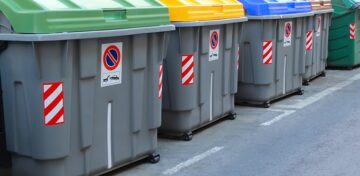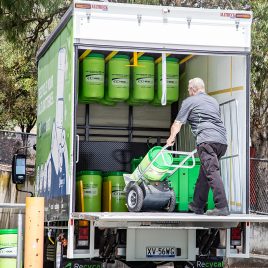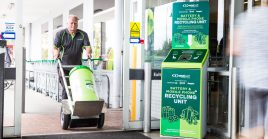

RECYCLING
A Quick Guide on How to Start a Recycling Business
By Fridolin Engel, VP Sales, Superfy, 10 January 2024

Have you considered turning a passion about sustainability into a thriving recycling business? The recycling market is booming and is projected to reach over 90 billion dollars by 2032. It is an opportunity to embark on an eco-friendly journey and learn how to start a recycling business.
Witnessing first-hand the growth in ESG advisory and consulting services, through to recycling opportunities in Vapes & batteries, the recycling vertical is seeing a boom in new initiatives and startups. With the adoption of technology, there are significant opportunities to improve the environment, whilst developing a highly profitable business.
Gain valuable insights on how to successfully secure your share of this growing market.
Types of Recycling Programmes
Let us now delve into the topic of “recycling,” which involves the transformation of waste into new materials. We will examine various forms of waste and explore how you can build a recycling business around it to promote environmental well-being.
1. Paper Recycling
A Paper Recycling Programme involves the systematic collection, processing, and reprocessing of paper waste to create new paper products. In a recycling program, paper materials such as newspapers, cardboard, magazines, and office paper are collected, sorted, and processed to remove contaminants like ink and adhesives. The cleaned paper fibres are then transformed into new paper products.
2. Aluminium Recycling
Used aluminium items such as beverage cans, foil packaging, and other aluminium products are collected from various sources. The collected material is sorted, cleaned, and processed to remove impurities and contaminants. Through various refining and melting processes, recycled aluminium is transformed into high-quality material suitable for manufacturing new products.
3. Glass Recycling
During the glass recycling program, used glass containers, bottles, and other products are collected. They are sorted by colour and cleaned to remove contaminants. Later, they are crushed into small pieces, called cullets, which can be melted and moulded into new glass products. Glass recycling significantly reduces the demand for raw materials, conserves energy, and decreases greenhouse gas emissions.
4. Plastic Recycling
Approximately 35 million plastic bottles are not recycled in the UK alone. A plastic recycling program collects used plastic, including bottles, containers, and packaging. The collected plastic is sorted, cleaned, and processed to remove impurities and contaminants. Through recycling processes like shredding, melting, and extrusion, the plastic is transformed into raw material.
5. Textile Recycling
A textile recycling programme reduces waste and minimises the environmental impact by collecting clothing, accessories, and household fabrics from donation centres and recycling facilities. The collected textiles are sorted based on their material composition and condition. Wearable items are cleaned and resold or donated, while textiles in poorer condition are processed through mechanical or chemical methods. This creates recycled fibres, which are later used for manufacturing new clothes.
6. Food Waste Recycling
On average, 24% of milk, bread, potatoes, and chicken goes to waste in the UK. Composting can transform scraps into nutrient-rich soil, reducing waste and aiding plant growth. In addition, food recycling programs use anaerobic digestion or other bioconversion processes. This transforms waste edible products into nutrient-rich compost, biogas, or other forms of renewable energy.
How to Start a Recycling Program?
If you want to find out how to start a recycling business to improve the environment, follow these steps:
Conduct a Waste Audit
A waste audit involves a thorough examination of the types and quantities of waste generated in a specific community. This process provides critical insights into the composition of the waste stream, identifying recyclable materials and guiding the development of a tailored recycling program. Understanding the specific waste challenges allows for the creation of targeted solutions that address the unique needs.
Research Local Regulations
Complying with local regulations is paramount when initiating a recycling program. Researching and understanding the guidelines set by local authorities ensures that the programme aligns with existing waste management policies. If you’re interested in how to start a recycling centre, you can seek advice from knowledgeable professionals such as government representatives.
Identify Collection Points
The success of a recycling programme hinges on strategically placed and easily accessible collection points. To boost recycling behavior, place bins in public spots and busy areas like transportation hubs, parks, shopping centers, and residential areas. This makes it easy for everyone to recycle waste products and show a commitment to being eco-friendly.
Build Credibility
If you are aiming to bring your recycling business into the market, it’s necessary to establish meaningful connections with important players in the industry. Attending industry events and networking with influential entities can help you gain valuable insights and make crucial contacts. And if you are looking for a genuine competitive edge, obtaining an endorsement from a well-known brand can make a huge difference.
Create a Collection Schedule
The traditional approach here is to establish a consistent collection schedule to prevent overflowing bins and maintain an efficient recycling process. While regular pickups ensure that recyclables are removed in a timely manner and prevent potential contamination, it is not a very efficient operation. Collecting from a bin that is only half full is less than ideal.
Instead, reach out to waste and recycling platform providers, like Superfy, who provide smart recycling software, sensors and containers to optimise your waste collections. In this way, you can achieve operational savings of up to 50%, by using sensors to only collect when necessary.
By way of example, Superfy has collaborated with Ecobatt, helping the organization recycle tonnes of batteries across many locations and reduce carbon emissions. According to Nick Dodd (Ecobatt’s CEO), “We have saved funds, streamlined the battery collection process, and improved vehicle routing due to Superfy.”
Embrace Technology
As above, the recycling sector is adopting advanced technology, making the process more efficient and streamlined. Incorporating digital tools, such as waste management software or mobile applications, streamlines data collection, tracking, and reporting. Implementing digital solutions enhances the efficiency and transparency of the recycling process, providing real-time insights that contribute to informed decision-making.
Educate the Community
Starting a recycling business involves more than just collecting and reusing items. It’s also about educating your team and others about the importance of recycling. You can team up with schools, conduct workshops, and use social media to spread information on how to recycle properly. By promoting environmental conservation, your recycling team are the ambassadors who help make a positive impact.
Wrapping Up
In light of the current state of our planet, it is imperative that we take action towards promoting a greener future. One way to do this is by starting a recycling programme that not only helps the environment but also generates income. With the aid of this comprehensive guide, you can gain a profound understanding of waste and the necessary steps to guarantee success in starting a recycling centre.
If you want to streamline waste management collections and other steps of the recycling program, partner with Superfy and benefit from the Leading Waste & Recycling Platform. Reach out to expand your knowledge. Book a Demo today.
FAQs
What is the most profitable recycling business?
The most profitable recycling business is the e-waste recycling sector. As electronic waste continues to grow, starting an e-waste recycling business can yield substantial profits. For example, in India, around 3.23 million tonnes of e-waste are generated annually.
Do businesses receive money for recycling?
Yes, businesses receive financial benefits through recycling rebates in the form of cash, refunds, or discounts on waste management expenses. This makes recycling a cost-effective waste disposal solution.
Can you get paid for recycling in the UK, Canada, EU, and Australia?
In the UK, you can receive cash back through rebate programs for recycling. Canada also offers money for selling waste materials. Meanwhile, Australians can earn 10 cents on a recycle-eligible container.
How do I recycle?
To recycle, follow these steps:
- Start with the basics, understanding what you can recycle
- Obtain recycling containers
- Identify recycling locations
- Recycle fewer common items
- Reuse whenever possible
What is the profit margin of recycling?
The profit margin in recycling is noteworthy. In 2022, the resale gross profit margin increased to 56%, up from 45% the previous year. For e-scrap recycling, the margin was 55% in 2022, a substantial rise from 35% in 2021.
Is recycling considered a profit or loss?
Recycling, in accounting terms, involves reclassifying items previously acknowledged in other comprehensive income to profit or loss. This adjustment termed a reclassification adjustment as per financial statements IAS 1, is a crucial accounting measure.
Who purchases recycled plastic?
Vanden is a prominent buyer and seller of plastics globally, dealing in various grades of plastics. They also purchase glass bottles, aluminium cans, batteries, and e-waste for recycling.
Should I consider starting to recycle?
You should start recycling as it reduces the need for landfills and expensive disposal methods. Recycling also diminishes the demand for extracting raw materials, which often leads to air and water pollution.
Find out how Superfy can help your Waste Management requirements. Contact a sales representative now.



